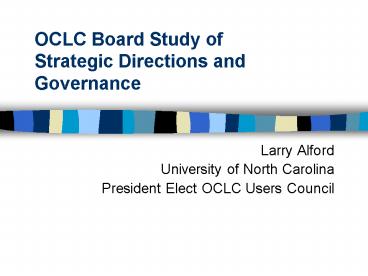OCLC Board Study of Strategic Directions and Governance - PowerPoint PPT Presentation
1 / 9
Title:
OCLC Board Study of Strategic Directions and Governance
Description:
Sara Ann Parker. Winston Tabb. Jonathan Zittrain. Advisory Council: Ex-Officio Members ... Jay Jordan. George Needham. Phyllis Spies ... – PowerPoint PPT presentation
Number of Views:113
Avg rating:3.0/5.0
Title: OCLC Board Study of Strategic Directions and Governance
1
OCLC Board Study of Strategic Directions and
Governance
- Larry Alford
- University of North Carolina
- President Elect OCLC Users Council
2
Advisory Council
- Nancy Eaton, Chair
- Larry Alford
- Min-Min Chang
- Christine Deschamps
- Sir Brian Follett
- Maurice Glicksman
- Martín Gomez
- Thomas Kirk
- Clifford Lynch
- Deanna Marcum
- Kate Nevins
- Sara Ann Parker
- Winston Tabb
- Jonathan Zittrain
3
Advisory Council Ex-Officio Members
- Bill Crowe
- Cees Datema
- James Houfek
- Jay Jordan
- George Needham
- Phyllis Spies
4
Important Meetings in the Consultation Process
February 2000
Users Council February 7-8 Discuss objectives,
process and role Solicit general input and
advice Visioning inputdevelop scenarios
Advisory Council February 25 Clarify charge, role
and process Discuss informationenvironment,
trends and roles of libraries Develop scenarios
Network Directors February 22 Discuss objectives,
process, role,and charter Discuss
informationenvironment and network roles and
points of view
OCLC Board February 28 Review project, process
and status Scenario results and other input to
date Key issues in early results
5
Important Meetings in the Consultation Process
March and April 2000
Research Library Directors Conference March
13-14 Introduce and discuss project with 100
directors of major libraries from around the
world Solicit general input and advice
OCLC Europe, the Middle East and Africa Users
Forum April 6 Discuss project with OCLC users
from these regions Solicit general input and
advice
OCLC Board April 17 Findings to date,
environmental scan Options (strategies,
organization, business models) Barriers, issues,
implications
Advisory Council April 18 April 28 Conference
Calls Update on results of meetings to date Next
steps
US Networks and Service Centers OCLC Advisory
CommitteesMarch-June Meet with these groups
throughout the spring as invited to discuss the
project, to present findings to date and to test
ideas
6
Important Meetings in the Consultation Process
May - August 2000
Users Council May 21-22 Findings to
date Implications for OCLC services Given the
above, whats OCLCs role? Business model
possibilities and insights
RONDAC May 24 Review discussion from Users
Council meeting Implications for networks of
discussion of OCLCs role at User
Council Business model
OCLC Board June 12 Update, review and discuss
deliverables Discuss governance alternatives,
issues, pros and cons, potential criteria
Advisory Council June 8 Update on results of
meetings to date Discussion of OCLC roles and
initial governance ideas Next steps
7
Important Meetings in the Consultation Process
September - October 2000
Advisory Council and OCLC Board September
24 Review draft final report Present final
recommendations draft for reality check,
discussion and provisional reactions
RONDAC October 5 Review draft final report
Provide reactions, ideas, suggestions
Users Council October 22-23 Review and contribute
to draft final report whats agreed, whats
still under debate, what happens next
8
Important Meetings in the Consultation Process
November 2000 and beyond
OCLC Board November 13 Final presentation to
Board by Advisory Council and A.D.
Little Followed by submission of final written
report Board review
If the Board review suggests changes in the Code
of Regulations, the Board must approve such
changes with ten (10) affirmative votes. Any
recommended changes would then be submitted to
the Users Council for its review, deliberation,
and action. A majority of Users Council delegates
present and voting at a meeting called to discuss
such changes is required to ratify any changes in
the Code.
Advisory Council Date TBD Conference Call Final
discussion of draft report, including reactions
of RONDAC and Users Council
9
Questions For Discussion
- 1. If OCLC did not exist today, what would
libraries seek to create in its place? What
aspects of your current OCLC participation do you
find most and least useful? - 2. What role options exist for OCLC? In what
ways does OCLC need to move toward globalization?
Does OCLC need to retain its US roots? If yes,
why? - 3. Are there other models for member
participation in governance that OCLC should
consider?































